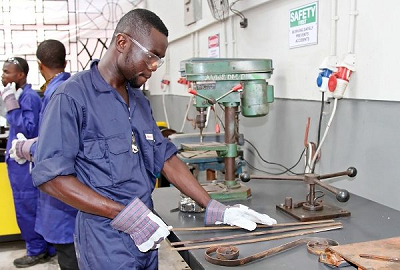Enrolment in Ghana’s Technical and Vocational Education and Training (TVET) institutions has surged by 270% since 2019, marking a major shift in the country’s education landscape and signalling renewed interest in skills-based learning.
Data from Planet One Group, which is collaborating with the Ministry of Education to modernise TVET institutions, shows enrolment rising from around 20,000 students in 2019 to over 74,000 in 2024. The initiative forms part of a broader national effort to align education with industry needs and create pathways for youth employment.
“The transformation underway in Ghana’s TVET sector is unlocking the potential of the country’s young people and laying the foundation for inclusive growth,” said Sanjeev Mansotra, Chairman of Planet One Group. “The remarkable surge in enrolment reflects the next generation’s growing interest in practical skills and vocational learning.”
The partnership between Planet One and the government began in 2019 with an ambitious plan to overhaul vocational education infrastructure. The first phase included the modernisation of 38 National Vocational Training Institutes, the establishment of two new foundry and machining centres, and upgrades to the Opportunities Industrialisation Centre in Accra.

Sanjeev Mansotra, Chairman of Planet One Group
Facilities were equipped with ICT labs, industrial-grade workshops, classrooms, and student hostels, significantly improving access for both urban and rural learners. More than 700 teachers and trainers have also received updated professional training, while new curricula were introduced across 28 trades to match the demands of Ghana’s growing industries.
The second phase, currently underway, focuses on expanding and upgrading TVET at the polytechnic level, with plans for advanced laboratories and workshops tailored to the needs of Ghana’s evolving economy.
Experts say these investments are timely. According to the World Bank’s 9th Ghana Economic Update, the country’s working-age population is expected to grow substantially over the next decade, offering opportunities for job creation if skills development keeps pace. The ISS African Futures study further projects that with sustained investment in education and economic diversification, Ghana’s economy could grow by an average of 9% per year between 2025 and 2043, lifting millions out of poverty.
Once seen as a less attractive alternative to university, vocational education is now gaining recognition as a critical driver of industrialisation and entrepreneurship. Increasingly, young Ghanaians, including women, are turning to TVET as a pathway to employment and self-reliance.
“As new graduates enter key sectors, the benefits of these reforms will ripple through the economy,” Mansotra added. “This transformation is opening doors for Ghana’s youth and positioning the country for long-term prosperity.”
READ ALSO:

